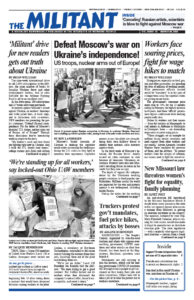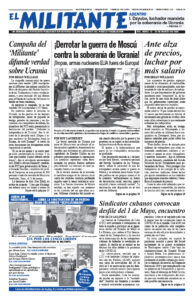“I am opposed to this senseless war of aggression, and I am calling on Russia to end this war right now to save all of us. We need peace right now,” renowned Russian opera singer Anna Netrebko said after Moscow invaded and began bombing civilian areas in Ukraine. This was a courageous act, a reflection of the widespread opposition in Russia to the war, and an encouragement to Russian workers and farmers to protest.
But Netrebko was “canceled” and fired by the Metropolitan Opera in New York because she wouldn’t issue further statements denouncing Russian President Vladimir Putin. Peter Gelb, the Met’s general manager, said the opera house will refuse to work with any artists who support Putin.
Many singers, artists, actors, writers and other cultural workers from Russia face being “canceled.” The Bolshoi Ballet was canceled by three venues in the United Kingdom; all Russian singers were banned from the Eurovision song competition, regardless of their position on the war; performances of Swan Lake by the Royal Moscow Ballet were canceled by the Helix theater in Dublin; the Munich Philharmonic canned its conductor, Valery Gergiev, as did the Rotterdam Philharmonic and Carnegie Hall.
Victoria and Albert Museum directors in Britain are discussing shuttering an exhibit of Peter Carl Fabergé’s famous eggs. Fabergé died in 1920, and the eggs have yet to take a position on Moscow’s invasion.
“Cancel culture” moves like these actually weaken, not strengthen the fight to defeat Putin’s invasion. They are part of efforts to paint the Russian people, their culture and art, as the problem. They deal a blow to political discussion and action needed by working people worldwide.
These campaigns are promoted by the imperialist regimes in Washington and across the EU. But the capitalist rulers in each of these countries aren’t really interested in defending the Ukrainian toilers, but are looking to defend and extend their own class pillage worldwide.
The widespread protests across Russia by people risking arrest and brutal persecution, alongside the determined resistance in Ukraine, are crucial for winning over working people there. It is only the working classes in Ukraine and in Russia, with backing from workers across Eastern Europe and worldwide, that have the power and class interests to end the war and bring down the Putin regime in Moscow.
To advance this, the fullest discussion and debate is necessary. Anything that closes down fraternization and dialogue is a deadly danger to progress on this working-class course.
Some have stood up to the “cancel” mongers, while at the same time speaking out against Moscow’s war. One arena of debate over the road forward is among scientists. Over 600 scientists and researchers in Russia issued an open letter opposing Putin’s invasion and war. It points out that the invasion can isolate Russia and turn the country into an international pariah, making it impossible for scientific work in the country that draws on collaboration internationally.
Some in the U.S. and elsewhere have called for barring Russian contributions and research from being printed in scientific journals. Nature magazine has taken a stand against this boycott, writing it “will continue to consider manuscripts from researchers anywhere in the world.”
A boycott “would divide the global research community and restrict the exchange of scholarly knowledge,” the magazine says, “both of which have the potential to damage the health and well-being of humanity and the planet.”
They insist on the importance of “the research community to uphold scientific collaborations with Russian scholars amid the invasion.” This allows for dialogue and debate.
At the same time, the journal’s editors make their opinion on the war clear. “Nature condemns this horrific invasion in the strongest terms — and calls on Russia to immediately end its attack. We support and stand in solidarity with Ukraine’s people, including its research community.”

